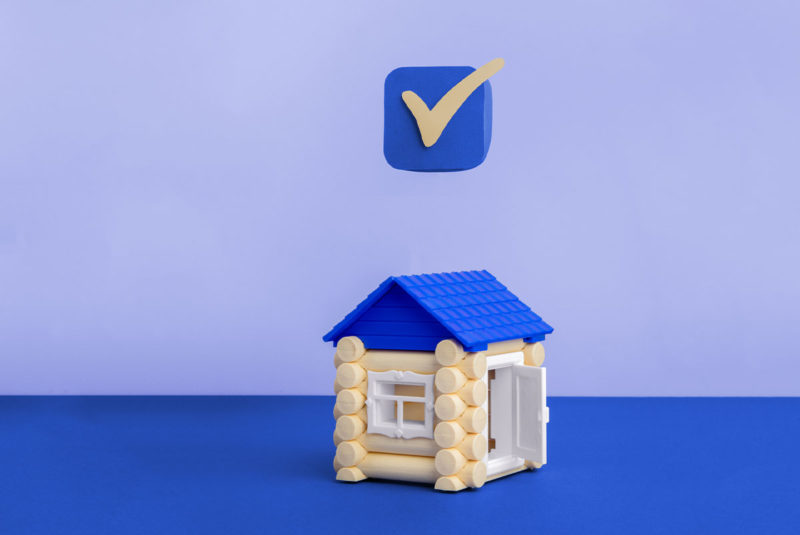Ready To Buy a Home?
Get Approved to Buy a Home
Rocket Mortgage® lets you get to house hunting sooner.
When most people buy their first home, they don’t put too much thought into moving or what they’ll do when they move. But as the years go by, different housing options might come to mind.
You’ve probably heard – and seen all over social media – that investing in real estate can make you money. Maybe you’re considering grabbing a piece of the action by renting out your home. Or would it be a savvier money move to sell your house and pocket the cash?
Will you make more money selling or renting your home? We’re here to help you figure it out. We’ll discuss some of the main considerations you should take into account as you think about renting or selling, and we’ll outline some of the pros and cons of each choice.
Rent vs. Sell: What Are the Responsibilities?
Renting out your home or selling it is a big decision. Either way, you’ll have work to do and considerations to take into account.
Whether you rent a home or sell it, you’ll have responsibilities. A landlord’s responsibilities never end, but after a sale, a seller’s responsibilities typically come to end. And depending on your current lifestyle and what you envision for your future, a landlord’s responsibilities may or may not entice you.
To make an informed choice about renting or selling, take the following into account:
Know the responsibilities of being a landlord
Being a landlord will add a lot of to-dos to your to-do list. Are you ready to take on more responsibilities? The list of new responsibilities will include:
- Navigating the financials and the taxes: You’ll need to keep a keen eye on your cash flow. The aim, of course, is to consistently generate positive cash flow, but your operating expenses can cut into your margins, and you’ll still be responsible for the property’s homeowners insurance and any mortgage payments. You’ll also need to get familiar with federal, state and local taxes.
- Knowing the laws: Landlords must comply with a variety of laws and regulations and should become very familiar with the Fair Housing Act,[1] which outlines the rights and responsibilities of landlords and tenants.
- Providing a safe home: You’re required to provide tenants with a clean, safe, livable home. This includes the basics: clean water, hot water, proper ventilation, smoke and carbon monoxide detectors, heat, working plumbing and electrical systems and locks. The home must also be compliant with local building codes and free of critters or bugs.
- Pricing the home: Because maintaining positive cash flow is crucial to a landlord’s success, it’s important to maximize the amount of rent you get from your property. Price the home too low, and you’ll miss out on bigger profits. Price it too high, and you’ll likely have a tough time attracting and keeping tenants. Whether you’re using a real estate agent or going it alone, survey your local renters’ market to get an idea of what to charge.
- Finding and screening tenants: How will you market your home? You can try an online listing platform or hire a real estate agent to advertise your home and show it to prospective tenants. Typically, you should budget 1 to 1 ½ month’s rent for this. To properly vet your potential tenants, you (or the service you hire) must check references and determine their ability to pay rent on time and take good care of your property.
- Preparing your home for tenants: Tenants will expect everything to be in working order, cleaned and repaired before they move in. Sometimes tenants want landlords to change the locks before they move in, too.
- Evictions and other potentially uncomfortable situations: If you shy away from confrontation, being a landlord may not be for you. Evictions are part of being a landlord and so are uncomfortable conversations about topics like not parking in front of a neighbor’s driveway and putting the garbage out on time. You may even have to deal with overdue rent and other potential conflicts. You can hire someone to manage your property, but it will cost money you may not want to spend.
- Property management and the handling of property maintenance: Landlords must decide if they will act as the property manager or hire a property management company. If a landlord’s top priority is generating positive cash flow, they may choose to go it alone. If you take that route, when the roof leaks or the toilet gets clogged, it’s all on you. Are you willing to spend your free time working on DIY projects or finding and hiring contractors to help with projects and repairs? If you hire a property management company, the company can handle many of these responsibilities for you, but their services will come at a price.
The cost of rental maintenance
- Whether you work with a property management company or not, maintaining a rental property can cost big bucks. You’ll need easy-to-access cash to pay for all the expenses that crop up, like pest removal, lawn mowing or replacing water heaters or HVAC systems.
- Your maintenance costs will largely depend on which part of the country you’re in. And the older your home is, the more it will likely cost to maintain it. On average, the annual cost of maintaining a home, including taxes, repairs and utilities, is $9,240.[2] That’s not exactly small change!
Not having cash on hand when a major home repair comes up can be devastating for your property and can jeopardize your profits and standing as a landlord.
Know the responsibilities of selling your home
There are lots of steps you’ll take before you sell your home. And, typically, once a home is sold, a seller’s responsibilities for the home ends.
Here are some steps you’ll take to sell your home:
- Get a real estate agent and attorney: While it isn’t required, consulting with real estate professionals can help you get familiar with your rights and buyers’ rights and helps you avoid surprises and headaches down the road.
- Know the tax implications: The primary tax implication for home sellers is capital gains tax, which is usually triggered when an asset is sold for a profit. Fortunately, there are some exemptions and differences in capital gains tax rates based on income and how long you owned the property. Since you can expect to pay up to 15% in capital gains tax, determining whether or not you qualify for an exemption may sway your decision to sell or rent your home.
- Prepare the home for sale: You’ll need to make sure everything is clean, decluttered and ready to display. Make sure great photos are taken when the house is clean. Trust us, no one wants to see your dirty dishes or overflowing laundry hamper.
- Make a list of problems or issues: This is important. Depending on the state you live in, you may need to disclose any known past and present issues with the home, including leaks, appliance malfunctions and infestations.
- Price the home: A real estate agent will help here, but you’ll need to review comps (comparable homes in your area) and their listing prices or past sale prices.
- Review offers: Weigh your offers with your real estate agent. Take note of any contingencies (stipulations that must be met before a sale is finalized). You may want to prioritize buyers with mortgage preapprovals and proof of funds letters.
- Complete any contingency requirements: If you do accept an offer with contingencies, make sure you and/or the buyer meet and complete any conditions within the requested time frames.
What Are the Signs You Should Rent Your House?
At this point, you’ve got a pretty good handle on the typical life of a landlord. If you’re comfortable with the risks and responsibilities, the landlord-curious among you will likely create spreadsheets to crunch the numbers. And depending on the results, you may find that renting can be profitable for you.
With 48.2 million rental units in the U.S.,[3] it’s evident that renting out your property can be profitable. But just how much profit can you make on a rental – and is it right for you? Every situation is unique, but we’ve outlined the most common advantages and drawbacks of renting your home.
Pros of renting your home
- Building equity: The value of real estate typically goes up over time. Even if you have a mortgage, your renters are helping you pay it and building equity in your home.
- Creating passive income: The rent you take in (minus the cost of a property manager if you have one) is essentially passive income. It means you’re making money without much effort on your part.
- Tax benefits: Landlords can usually claim all sorts of expenses, such as mortgage interest, property tax, maintenance costs and depreciation. But you also have to declare rental income. Make sure you consider this when estimating your cash-in-pocket from the rental.
- Waiting out a buyer’s market: If you know you’ll have a tough time selling your home, renting is a good way to buy time until market conditions favor sellers.
Cons of renting your home
- Lack of investment diversity: If all or most of your investment money is tied up in your rental property, you’re missing opportunities to invest in a more diversified portfolio. It’s like having your eggs in one basket. If the basket drops, your eggs are destroyed. A diversified portfolio can protect you from losing a lot of investment dollars if something goes wrong with your rental property (your primary investment).
- Landlord hassles: Collecting rent and finding tenants can add up to a significant time and energy commitment that may not be worth the income you’d get from renting. If you’re a party animal and are missing opportunities to socialize because you’ve got to replace leaky faucets, being a landlord may not be the right fit for your lifestyle.
- Hamper your ability to get another mortgage: If you have a mortgage on your rental property, your remaining debt will be added to your debt-to-income (DTI) ratio. Depending on your DTI and other factors, you may be charged higher interest rates on future mortgages or other loans.
- Expenses: You’ll have to pay out of pocket for maintenance costs.
What Are the Signs You Should Sell Your House?
Not quite convinced that selling your home is the way to go? Maybe you’re hesitating because you’re not the landlord type. Maybe you’ve got a lot of equity built up in your home. Or you’re worried about the capital gains tax you might face.
Selling a property is no small task, but the upside of selling isn’t something to ignore, either. If the benefits of selling your home don’t earn your confidence, listen to your gut and trust any feelings of apprehension you might have.
Pros of selling your house
- Cashing in on equity: If you’ve built up a lot of equity in your home, selling it can free up a lot of cash. If the value of your home has increased significantly since you bought it, that could equal a lot of money in a sale. That’s money you can invest or put toward purchasing a new home.
- Avoiding capital gains tax: If you’ve lived in your home for at least 2 of the past 5 years, you can exclude up to $250,000 in capital gains from the sale of your home ($500,000 if you’re married and file jointly).
- Freedom, sweet freedom: When you’re not tied to a home, you’ve got more options. Maybe you’d like to move to a different location, rent short term or buy a different type of home.
Cons of selling your home
- Selling process and fees: Home sales aren’t always smooth. You may need to deal with a buyer who makes unexpected demands or deal with an inspection issue. Then there is the cost of selling a home – real estate agent fees, closing costs, etc.
- You could lose money: Depending on the market and the condition of your home, you could end up in a worse financial position if you sell it rather than stay in it or rent it out.
- You can’t change your mind: If you’re considering renting your home so you can live in it again one day, selling pretty much closes that door.
Rent vs. Sell: Consider the Housing Market
Your decision to sell or rent will likely be influenced by the local housing market. The questions you’ll always want answered are whether you’ll turn a profit and whether the profit is worth the effort.
If you decide to sell, you’ll likely need a new place to live, so make sure you’re keeping an eye on market conditions in the area of your choice. If you decide to rent after selling your home, consider consulting with a real estate agent who is knowledgeable about area rentals.
One indicator of a good time to rent your home or sell is whether it’s a buyer’s market or a seller’s market and whether either choice will make you the money you’d like to get out of the deal.
Considerations in a buyer’s market
Selling your home in a buyer’s market will likely be more challenging than selling it in a seller’s market. In a buyer’s market, the inventory of available homes is larger than the pool of interested buyers.
This puts the buyer in a better position to negotiate prices or add contingencies to an offer. A seller would likely need to work harder to attract buyers, enticing them with incentives like lower asking prices.
A buyer’s market might be a good time to rent your home so you don’t end up selling it for less than it’s worth.
Considerations in a seller’s market
If you’re debating whether to sell or rent, a seller’s market is a great time to sell.
In a seller’s market, there is a small inventory of homes and a large group of potential buyers. This creates competition for the few homes on sale, resulting in higher prices, and sometimes, bidding wars.
To Rent or To Sell: What’s the Best Move?
There are lots of factors that go into deciding whether to rent your home or sell it. Perhaps the most important one is profitability. Crunching numbers will help you decide whether renting out your home is worthwhile or selling is a better move.
Looking to make a change?
Whether you want to buy a house, refinance or take cash out, you’re not alone. The experts are just a click away.
The Short Version
- Whether you rent a home or sell it, you’ll have responsibilities. A landlord’s responsibilities never end, but after a sale, a seller’s responsibilities typically come to end
- One indicator of a good time to rent your home or sell is whether it’s a buyer’s market or a seller’s market
- Crunching numbers will help you decide whether renting out your home is worthwhile or selling is a better move
U. S. Department of Justice. “THE FAIR HOUSING ACT.” Retrieved July 2022 from https://www.justice.gov/crt/fair-housing-act-1
National Association of Home Builders. “Operating Costs of Owning a Home.” Retrieved July 2022 from https://www.nahb.org/-/media/04F57989FBC74C82BEF51C382C654E54.ashx
Pew Research Center. “As national eviction ban expires, a look at who rents and who owns in the U.S.” Retrieved July 2022 from https://www.pewresearch.org/fact-tank/2021/08/02/as-national-eviction-ban-expires-a-look-at-who-rents-and-who-owns-in-the-u-s/




